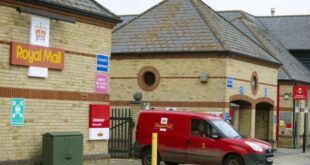Dozens of people have been left out of pocket after discovering the stamps they bought were counterfeit.
Stamps without a barcode are no longer valid for use as of August, with recipients now being charged £1.10 if they don’t have a scannable element.
Old stamps which are no longer valid can be exchanged for new, free replacements through the Royal Mail.
But more than 40 customers have told The Telegraph both old and new stamps, despite being purchased genuinely from a Post Office branch, were labelled as fraudulent or invalid.
Susan Harrison, from Hartlepool, tried to exchange eight old stamps she had bought from a Post Office counter in WH Smith.
She received a letter from Royal Mail a few weeks later saying they could not be swapped as they had ‘already been used or are not genuine’.
The 60-year-old told the publication: ‘I’m gobsmacked. If you can’t buy stamps in a Post Office without them being counterfeit then where can you buy them?’
Several other people flagged issues with the new barcode system, with the organisers of an equine championship and some Labour councillors being stung by having to reissue communications due to unknowingly using ‘faulty’ stamps.
Royal Mail said new barcoded stamps will improve efficiency, and will add further ‘security features’.
Counterfeit new stamps have also been seen for sale on eBay at a fraction of the genuine price – they look real but are copied from genuine stamps, so the barcodes would be flagged as ‘already used’.
A Royal Mail spokesperson said: ‘We encourage any customer who believes they have been incorrectly surcharged to send the stamps they have remaining to us. It is important that we can investigate and determine whether the stamps are genuine, as well as understand exactly where they were purchased.
‘Barcoded stamps have been in use since February 2022 and each barcode is unique.
More: Trending
‘This uniqueness enables our machines to check the validity of stamps and to identify barcodes that have been through the network before.
‘If one of these stamps is showing as previously used it may suggest that the stamp has been reproduced by a counterfeiter.
‘If a stamp is identified by our machines as counterfeit, it will also be individually checked by a member of our team before the recipient is asked to pay a surcharge.’
A Post Office spokesperson said it receives its stamps direct from Royal Mail, which would have to verify whether a stamp is fake or not.
Get in touch with our news team by emailing us at webnews@metro.co.uk.
For more stories like this, check our news page.
Get your need-to-know
latest news, feel-good stories, analysis and more
This site is protected by reCAPTCHA and the Google Privacy Policy and Terms of Service apply.




